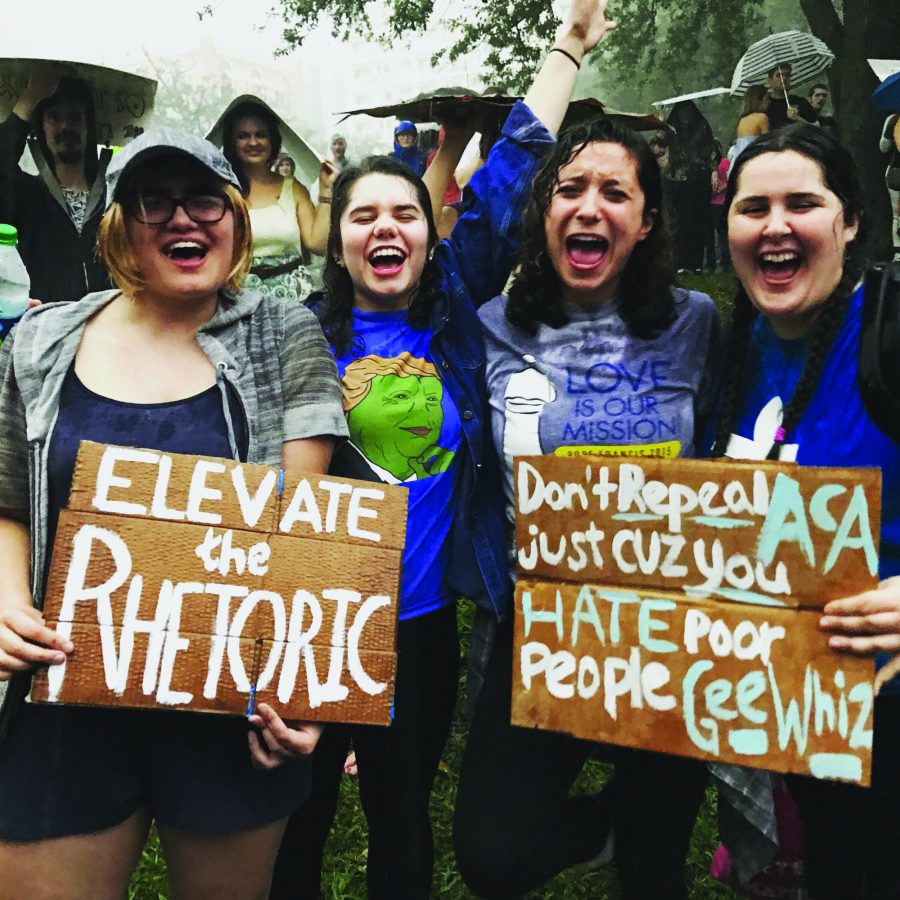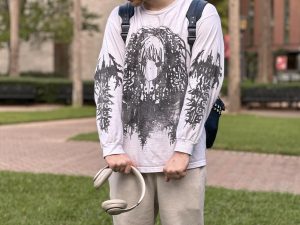Loyola students are getting involved and making changes in response to the election
(Left to right) Mercedes Sandoval, Brianna Daniel-Harkins, Gabriella Pucci and Dierdre Crean attend the Women’s March in New Orleans. Despite accusations that millenials are all talk and no bite, Loyola students and other millenials are actively trying to make change. Photo credit: Courtesy of Brianna Daniel-Harkins
February 16, 2017
Millennials are surrounded by a stigma that displays a passive citizenship. However, there are many ways this age group can make a difference, and some Loyola students are paving the way.
Chandler Keen, senior musical theatre major, works closely with the Women’s Resource Center on campus. Since the election, she has been keeping a close eye on many of the executive orders that have been passed and thinking more critically about the effects that these orders potentially have on marginalized individuals.
She has also attended the Creating Change LGBTQ leadership conference in Philadelphia, where she learned about advocacy within the LGBTQ community. Now she has been working hard to organize events for Loyola’s LGBTQ group, Spectrum, to schedule events that simultaneously educate the public and create a safe space for people who occupy this marginalized group.
With Keen in mind, what is it that folks are afraid of when it comes to millennial involvement — or should I say under involvement? Run for Something, a web and social media platform that helps support young people who want to run for office, reported on Jan. 27th that within one week, 1,200 millennials have signed up to run for public office.
“Here’s some food for thought: Trump could inspire just as big a call to public service as President Obama,” tweeted the Run for Something campaign.
What Keen hopes our generation steers away from is “screen advocacy,” meaning we utlilize social media to display our opinions, but do not take any more action than pressing “post.”
“People are afraid of our age group because we want and are creating change,” Keen said.
By using social media, Keen suggested that we can stay updated on what is happening in our country and resist behaviors that are not bound by morality and love.
“Call your senators. Challenge people who make racists comments. Take your thoughts and utilize them to create a movement,” said Keen.
But what if a millennial’s dilemma actually stems from the phone in their hand? What if calling their senators activates anxiety because it isn’t a simple text or Facebook message where you can wait to reply with an edited response?
Echo Through the Fog, an online blog, provides a great example of how to call your reps when you’re anxious. It recommends setting aside time, secluding yourself, researching who your representatives are, writing out what you plan to say, taking a deep breath, dialing the number and reading from your script.
Michael Pashkevich, senior Biology major, is another active Loyola millennial. In the last year he has become interested and involved with in assisting locally resettled refugees and combating popular myths regarding the refugee resettlement process.
“I am helping to facilitate a partnership among Loyola Honors, Touro Synagogue and Catholic Charities New Orleans (the organization responsible for refugee resettlement in the Greater New Orleans area) that will assist locally resettled refugees acclimate to New Orleans and enjoy cultural outings at Loyola and throughout New Orleans,” said Pashkevich. “Additionally, a grant won by Loyola Honors in December will subsidize Jefferson Parish transit costs to allow locally resettled refugees to travel for purposes such as picking up groceries, going to work and attending driving classes.”
Pashkevich feels that millenials often are seen as reactionary and that they’re civic involvement stops with protests. He encourages concrete actions that go beyond just talk or protests.
“So often, millennials want to innovate. While innovation is important, it should be recognized that resources and time can often cause more social impact when allocated towards already established organizations,” Pashkevich commented.
Although we have been raised in an evolving technological era that has made each of us naturals with social media, Keen and Pashkevich are just two examples of ways millennials are stepping beyond the share button and taking action. Hopefully soon, instead of teaching older generations how to Facebook, they will be looking to us for inspiration and answers.
If you’re interested in making change, but don’t know how, click the links below to discover local and national ways to make change:
- How to find and contact your Representatives:
http://www.house.gov/representatives/find/
- How to find and contact your Senators:
https://www.senate.gov/senators/contact/
- Loyola’s Women’s Resource Center:
http://www.loyno.edu/womenscenter/
- New Orleans Touro Synagogue Refugee Response:
https://tourosynagogue.com/refugee-response/








Paul Rankin • Feb 24, 2017 at 8:19 am
So, the implication seems to be that any republican/conservative/Trump supporter is a threat. What is the plan to remove these dangerous thinkers (students/faculty/staff) from the University?